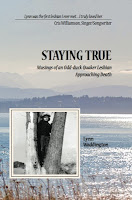As far as I’m concerned, the world could use a few more
spiritual memoirs. A lot more people of faith writing about their spiritual
journeys. Fortunately, lifelong
Quaker Lynn Waddington did just that during the final two years of her life. And
her partner, Margaret Sorrel, labored through her own grief after Lynn’s death
to bring this story to print in Staying
True—Musings of an Odd-duck Quaker Lesbian Approaching Death.
The title should be the first clue that this isn’t your
average memoir. Bruce Birchard, former General Secretary of Friends General
Conference, calls it “a spiritual memoir for the twenty-first century,” and I
couldn’t agree more. Lynn took her
spirituality seriously (though with a great deal of humor), explored it deeply,
and shared it honestly.
For Lynn, life was about constantly discerning her true
leadings, and she generously takes her readers along on that journey. I’ve turned down the corners of many
pages to be able to return to her stories and experiences that speak to
me. Here’s one example:
We are seekers, not
finders. For every profound experience I’ve had, I’ve been left with deep
questions.
Lynn also wrote eloquently about something that often is
beyond words, that experience of the presence of the Divine. She did find the vocabulary,
though, when she wrote about one day in early adolescence when she took her
questions of her identity with her to a favorite spot along the Delaware River:
I felt the calm seep
into me as it usually did. And then I was wrenched open. . . I realized I was
trembling and crying. Sweat was running down my sides. I was seen through and
through. . . . Every flaw of my being was visible, but the fear that brought
was dissolved by the sweetest, most tender love I had ever known. . .This was
God—who saw me uniquely and bent down to touch me alone.
In Staying True,
we have not only an account of the path of Lynn’s spiritual journey through
young adulthood, her professional life, her role as a parent, and her
relationships, but she also invited us in to her deep seeking near the end of
her life. Although she continued
to ask questions about what she was meant to do, she also shared the peace she
felt from her knowledge of being held in God’s love.
Staying True is a
source of wisdom, comfort, challenge, and more than a few belly laughs as well
as tears.
To find out more about Staying
True, visit Plain Speech Press.




